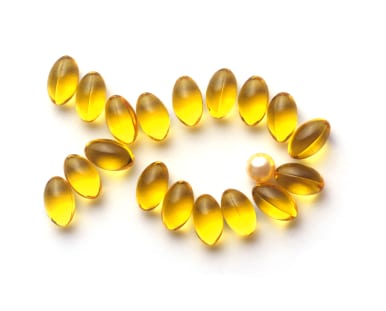 How many times have you heard that you should eat more fish? Fish is low in calories and high in protein, but the main reason fish is a good choice is because of the heart-healthy omega-3 fatty acids it contains. Omega-3s are a type of “good fat,” because they help to reduce inflammation that can lead to heart attacks and other chronic health problems. As it turns out, omega-3 fatty acids may have some added benefits for athletes and people who work out.
How many times have you heard that you should eat more fish? Fish is low in calories and high in protein, but the main reason fish is a good choice is because of the heart-healthy omega-3 fatty acids it contains. Omega-3s are a type of “good fat,” because they help to reduce inflammation that can lead to heart attacks and other chronic health problems. As it turns out, omega-3 fatty acids may have some added benefits for athletes and people who work out.
Why Athletes Need More Omega-3s in Their Diet
One of the benefits of omega-3 fatty acids is they reduce inflammation. As you’ve probably already experienced at least a few times in your life, unaccustomed exercise can lead to muscle inflammation and soreness, a condition known as delayed-onset muscle soreness. That’s the soreness that makes it hard to work out or even get up out of a chair a day or two after beginning a new exercise routine or doing a routine you’re not accustomed to. Eating more omega-3 fatty fish could help to ease some of the pain of delayed-onset muscle soreness by reducing inflammation.
In one study published in the Clinical Journal of Sports Medicine, men that took a fish oil supplement rich in omega-3 fatty acids experienced less delayed-onset muscle soreness after a tough 40-minute workout than men that took a placebo pill. This isn’t surprising since omega-3 fatty acids also seem to help the pain and inflammation of diseases such as arthritis.
Can Omega-3s Improve Athletic Performance?
The omega-3s in fatty fish and fish oil supplements may do more than just ease muscle soreness. According to a study published in the European Journal of Applied Physiology, they may delay exercise fatigue by boosting blood flow to exercising muscles. Eating your salmon could help you ward off exercise fatigue a little better when you work out. Some research even suggests that the omega-3s in fish oil help to boost the loss of body fat when combined with exercise.
How to Add More Omega-3s to Your Diet
The best natural source of omega-3s is fatty fish, and the fish that are then the best sources are wild salmon, mackerel, herring, anchovies, and sardines. Mackerel is a large fish, which means it’s more likely to contain mercury and other contaminants compared to smaller fish such as sardines and anchovies. Always buy wild Salmon, not farmed, since farmed salmon is lower in omega-3s and contains higher levels of contaminants.
What if you don’t like fish? Walnuts and flaxseed contain a precursor called alpha-linolenic acid that the body can convert to DHA, an omega-3, but it doesn’t do it very efficiently. That’s why some people take fish oil supplements. If you buy a fish oil supplement from a reputable manufacturer, it should be very low in contaminants. Talk to your doctor before starting one, especially if you take blood thinners.
The Bottom Line?
The omega-3 fatty acids in fatty fish and fish oil supplements could be an athlete’s best friend, although more research is needed. In the meantime, omega-3s are heart-healthy, and most people don’t get enough of them. Next time you’re cruising the grocery store aisles for a healthy source of protein, pick up some wild Alaskan salmon.
References:
Clin. J. Sport Med. 2009; 19: 115-9.
Eur. J. Appl. Physiol. 2006; 97: 347-54.
International Journal of Obesity. 31, 1560-66.
Related Articles By Cathe:
The Surprising Role that Fish Oil Plays in Muscle Hypertrophy
Why Fish Oil Capsules Aren’t the Best Way to Get Omega-3s
Fish Oil Versus Krill Oil: Which Has Greater Health Benefits?

